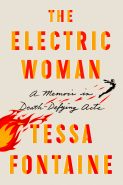
Review: The Electric Woman: A Memoir in Death-Defying Acts by Tessa Fontaine
Reviewed by B.J. Hollars

The Electric Woman: A Memoir in Death-Defying Acts
Tessa Fontaine
Farrar, Straus, & Giroux
$27.00; 384 pp
ISBN: 978-0374158378
Eating fire has its risks, but so does not eating fire. “The only way to do it is to do it,” Tessa Fontaine writes in her debut memoir. “There is no trick.” And so begins Fontaine’s summer performing with World of Wonders, the last American traveling sideshow. Though she’s hardly prepared for the job, she soon embraces it, taking part in an immersive adventure that demands she handle snakes, perform magic, escape from handcuffs, endure electricity, and ingratiate herself among her unique colleagues, some of whom happen to hammer nails into their noses and swallow swords.
Running concurrent to her time in the sideshow is the life she’s leaving behind: her mother, who survives a major stroke, but is left severely debilitated. As Fontaine’s stepfather plans and carries out a European tour for his ailing wife, Fontaine performs before one small town after another, creating the illusion that her life has continued unchanged. It hasn’t. Of Fontaine’s many tricks, her greatest is juggling both halves of her heart-wrenching memoir. At face value, the story of a sideshow and the story of a mother’s stroke might seem an odd pairing, yet Fontaine bridges this gap by way of a shared theme: the artifice of performance. Whether one’s tricking the crowd or tricking oneself, at some point, the trick always ends. And when the curtain closes and the audience vanishes, all we’re left with is ourselves.
Fontaine—who spends much of her summer luring prospective ticket buyers as a bally girl—leaves the spotlight as soon as she’s able. It’s there—in her quiet moments of reckoning—that readers, too, are asked to confront the world beyond the trick, the world where truth lives. Peppered throughout the sideshow’s forward momentum are flashbacks featuring Fontaine’s past interactions with her mother, including one particularly revealing scene in which Fontaine’s mother, Teresa, encourages her daughter to attend a play at a private school, one she hopes her daughter will soon be admitted into. Upon spotting the headmaster in the crowd, Teresa urges Tessa to introduce herself, hopeful it will give her a leg up in the admissions process. Fontaine blanches at the potential awkwardness of the situation, but her mother holds firm. “Tessa,” she says. “Sometimes you’ve just got to do the hard thing.” For much of the memoir, Fontaine is tasked with this very mission. Yet for her, the “hard thing” is hardly limited to her external situation in the sideshow; rather, it’s her internal struggle that proves most difficult. Specifically, how to reconcile her relationship with her mother in the moments they have left. Fontaine’s time with the sideshow offers many lessons, though the most poignant is this: for better or worse, life is always the main attraction. The trick is to never blink. The trick is to celebrate the wonder.
B.J. Hollars is the author of several books, most recently Flock Together: A Love Affair With Extinct Birds, From the Mouths of Dogs: What Our Pets Teach Us About Life, Death, and Being Human, as well as a collection of essays, This Is Only A Test. Hollars serves as a mentor for Creative Nonfiction, a contributing blogger for Brain, Child and the founder and executive director of the Chippewa Valley Writers Guild. An associate professor of English at the University of Wisconsin-Eau Claire, he lives a simple existence with his wife, their children, and their dog. For his writing, visit www.bjhollars.com; for his podcasts, visit www.snippetspodcast.com.

Leave a Reply